2025-03-12
How to Turn Client Meeting Notes into Professional Presentations with Proposal Automation
Transform discovery call notes into compelling digital marketing proposals in minutes
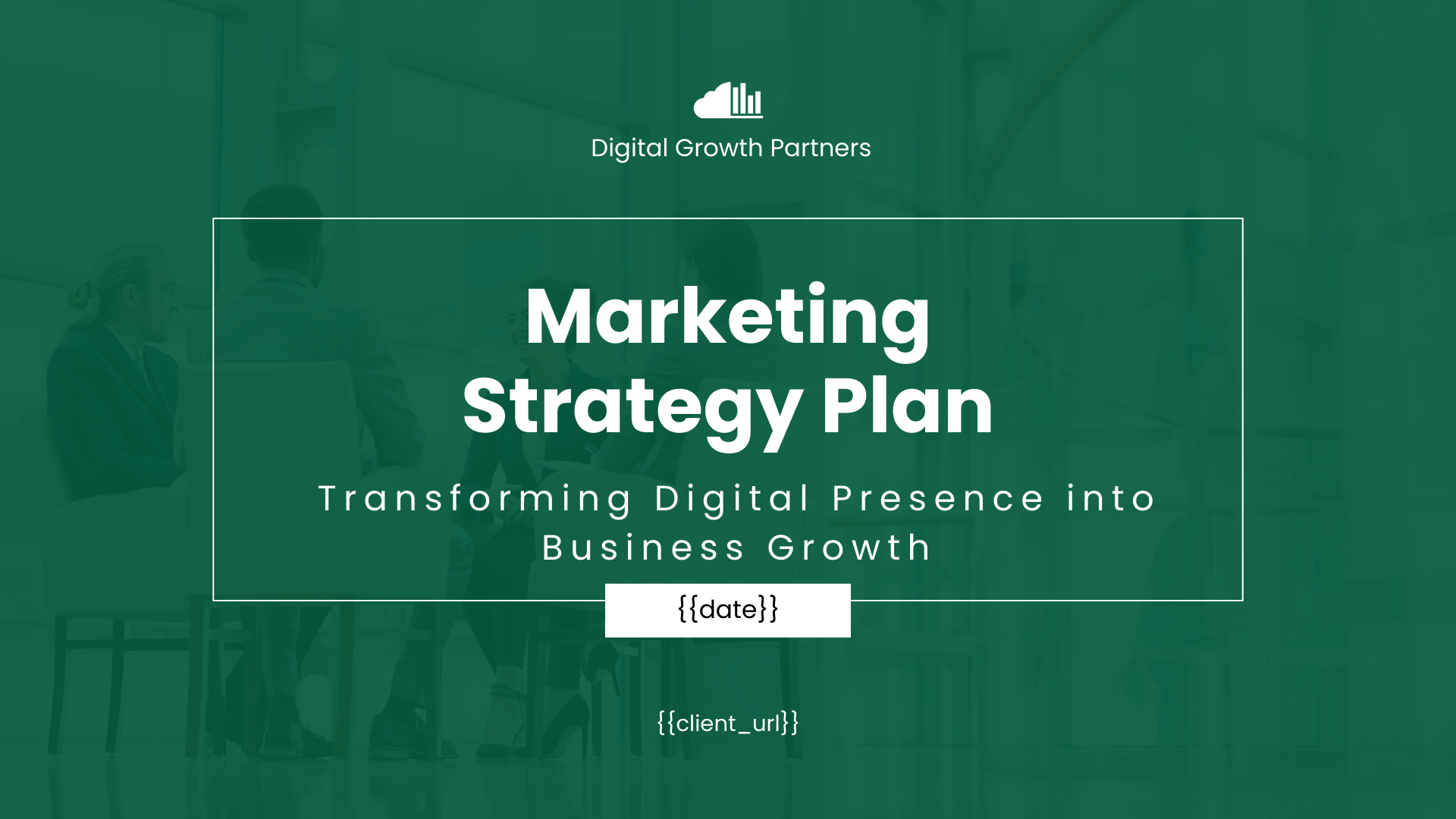
For digital marketing agencies, the time between a discovery call and sending a proposal can make or break a potential client relationship. Traditional proposal software and manual processes create delays, but AI-powered proposal automation can transform discovery calls into polished presentations instantly. For a comprehensive overview of how this technology is revolutionizing business development, explore our complete guide to proposal automation.
Every passing hour reduces your chances of winning the business. Let’s explore how LLeMental helps digital marketing agencies transform a discovery call with a client into a polished proposal within minutes. For this example, we’ll use the made up marketing agency Digital Growth Partners and a discussion with a potential client Bridgetown Brewing Co.
The Initial Client Meeting Notes
Here are the discovery call notes from our “meeting” with a potential client, a downtown Portland craft brewery looking to expand their digital presence. In order to get these notes, I had ChatGPT interview me in place of a marketing specialist. I think it did a pretty good job.
Bridgetown Brewing Co. - Discovery Call Notes
Date: Mar 10, 2025
Time: 11:00 AM PST
Attendees: Shane Haggerty (DGP), Sam Reed (Bridgetown)Location: 235 SW 2nd Ave, Portland
Business Age: 1 year
Current/Target Demographics:
- Current: Men 40+
- Target: Adults 21-35
Digital Presence:
- Website: ~2,500 monthly visitors, professional but stagnant
- Instagram: 850 followers, employee managed
- Twitter: 400 followers, irregular posting
- Current ad spend: $500/mo split between FB/Google
- Approved for increase to $1k/mo
Key Issues:
- Struggling to reach younger audience
- Limited social media presence
- No email marketing program
- Staff too busy for content management
- Heavy competition in downtown area
Next Steps:
- Send proposal by Friday
- Include social growth projections
- Price full service package
- Timeline: Implementation before summer season
Preparing Your Sources
LLeMental functions as an advanced AI document generator that can analyze multiple data sources to create comprehensive digital marketing proposals. For this exercise, we provided:
- Discovery Call Notes (shown above) in a Microsoft Word Document
- An additional Digital Marketing Assessment (shown below) in PDF format [also performed by ChatGPT]
- Client Website URL (bridgetownbrewingportland.com)
The Traditional Proposal Creation Challenge: Why Agencies Need Proposal Generation Software
Creating a compelling marketing proposal isn’t just about transferring meeting notes into PowerPoint. It requires synthesizing information from multiple sources into a cohesive narrative that resonates with potential clients. Let’s look at what this process typically involves:
1. Post-Meeting Organization
After the discovery call, marketing teams spend hours organizing scattered information:
Information Fragmentation: Discovery calls generate diverse data types that require manual consolidation—handwritten notes, digital recordings, follow-up emails, and supplementary research materials scattered across multiple platforms and team members.
Data Transcription Bottlenecks: Converting audio recordings and handwritten notes into usable digital formats consumes significant time, with accuracy depending on individual note-taking skills and attention to detail during client meetings.
Research Compilation: Gathering relevant metrics from client websites, competitor analysis, industry benchmarks, and market conditions requires manual searching and data extraction from multiple sources.
Context Preservation: Maintaining the nuanced context and specific client language from discovery conversations while organizing information into structured proposal sections.
2. Strategic Development
Once the information is organized, strategists need to transform raw data into compelling recommendations:
Opportunity Analysis: Identifying key growth opportunities requires deep analysis of client current state versus industry benchmarks, competitive positioning, and market trends—a process that demands both analytical skills and industry expertise.
Solution Architecture: Developing specific, actionable recommendations that address client pain points while showcasing agency capabilities requires custom strategy development for each prospect’s unique situation.
Projection Development: Creating realistic growth projections, ROI calculations, and timeline estimates based on client budget constraints and market conditions demands both analytical rigor and industry experience.
Package Structuring: Designing service packages that align with client budget parameters while maximizing perceived value requires careful balance of scope, pricing, and deliverable definition.
3. Design and Production
Finally, all strategic information needs transformation into a polished, branded presentation:
Template Selection and Customization: Choosing appropriate slide layouts from master templates and adapting them to specific client needs while maintaining brand consistency across all visual elements.
Content Integration: Writing compelling copy that translates strategic recommendations into persuasive, client-focused language while ensuring technical accuracy and professional tone.
Visual Design Coordination: Creating charts, diagrams, and graphics that support strategic recommendations while adhering to brand guidelines and maintaining visual hierarchy throughout the presentation.
Quality Assurance Workflows: Multiple rounds of internal review to ensure accuracy, brand compliance, and message clarity—often involving senior team members whose time could be better invested in strategic client work.
This process typically requires multiple team members and several rounds of internal review. A single proposal can easily consume tens of hours of billable time—time that could be spent serving existing clients or pursuing new opportunities.
4. Quality Control and Consistency Issues
Manual proposal creation introduces variability that can undermine professional credibility:
Brand Inconsistency: Under tight deadlines, teams often use outdated templates or inconsistent formatting, diluting brand impact across client touchpoints.
Information Accuracy: Manual data entry increases the risk of errors in client names, project details, pricing, or contact information—mistakes that can eliminate agencies from consideration.
Version Control Problems: Multiple team members working on proposals simultaneously can create confusion about which version contains the most current information.
Compliance Gaps: Manual processes make it difficult to ensure all proposals include required legal disclaimers, terms, or regulatory language specific to different industries.
5. Scalability Limitations
Traditional manual processes create artificial growth constraints:
Resource Bottlenecks: As agencies grow, proposal creation becomes a limiting factor. Teams can only respond to a finite number of opportunities before quality suffers or response times become uncompetitive.
Expertise Distribution: Senior team members with proposal-writing skills become bottlenecks, preventing junior staff from contributing effectively to business development efforts.
Peak Period Struggles: During busy seasons or when multiple large opportunities arise simultaneously, manual processes force agencies to choose between speed and quality.
Proposal automation software eliminates these constraints by enabling consistent, high-quality output regardless of volume or timeline pressures.
This process typically requires multiple team members and several rounds of internal review. A single proposal can easily consume tens of hours of billable time—time that could be spent serving existing clients or pursuing new opportunities.
The LLeMental Difference
LLeMental doesn’t try to reinvent your workflow—it enhances it. Using your existing presentation templates and brand guidelines, LLeMental acts as an intelligent assistant that:
- Processes Multiple Inputs
Instead of manually collating information, LLeMental simultaneously analyzes:
- Discovery call notes
- Marketing assessments
- Website data
- Competitive analysis
- Industry benchmarks
- Maintains Brand Standards
Unlike other AI tools that generate generic presentations, LLeMental works within your established templates to:
- Preserve brand consistency
- Maintain slide structures
- Use approved formatting
- Keep existing design elements
- Creates Client-Specific Content
LLeMental doesn’t just fill in blanks—it generates tailored content that:
- Addresses specific client challenges
- Incorporates unique selling points
- References relevant metrics
- Provides actionable recommendations
LLeMental doesn’t try to reinvent your workflow—it enhances it. Unlike other platforms that force agencies to rebuild from scratch, our comparison of leading AI proposal generator tools shows why template preservation offers the most seamless integration for established agencies.
A Streamlined Process with Proposal AI
Using LLeMental with Bridgetown Brewing Co., our process looked like this:
-
Upload Discovery Materials
-
Select Template
-
Generate and Review
Total time from upload to client-ready presentation: Less than 5 minutes.
Let’s see how LLeMental mapped our client specific data to our Proposal Shell. I chose a few specific slides from the shell to keep it brief.
Shell:
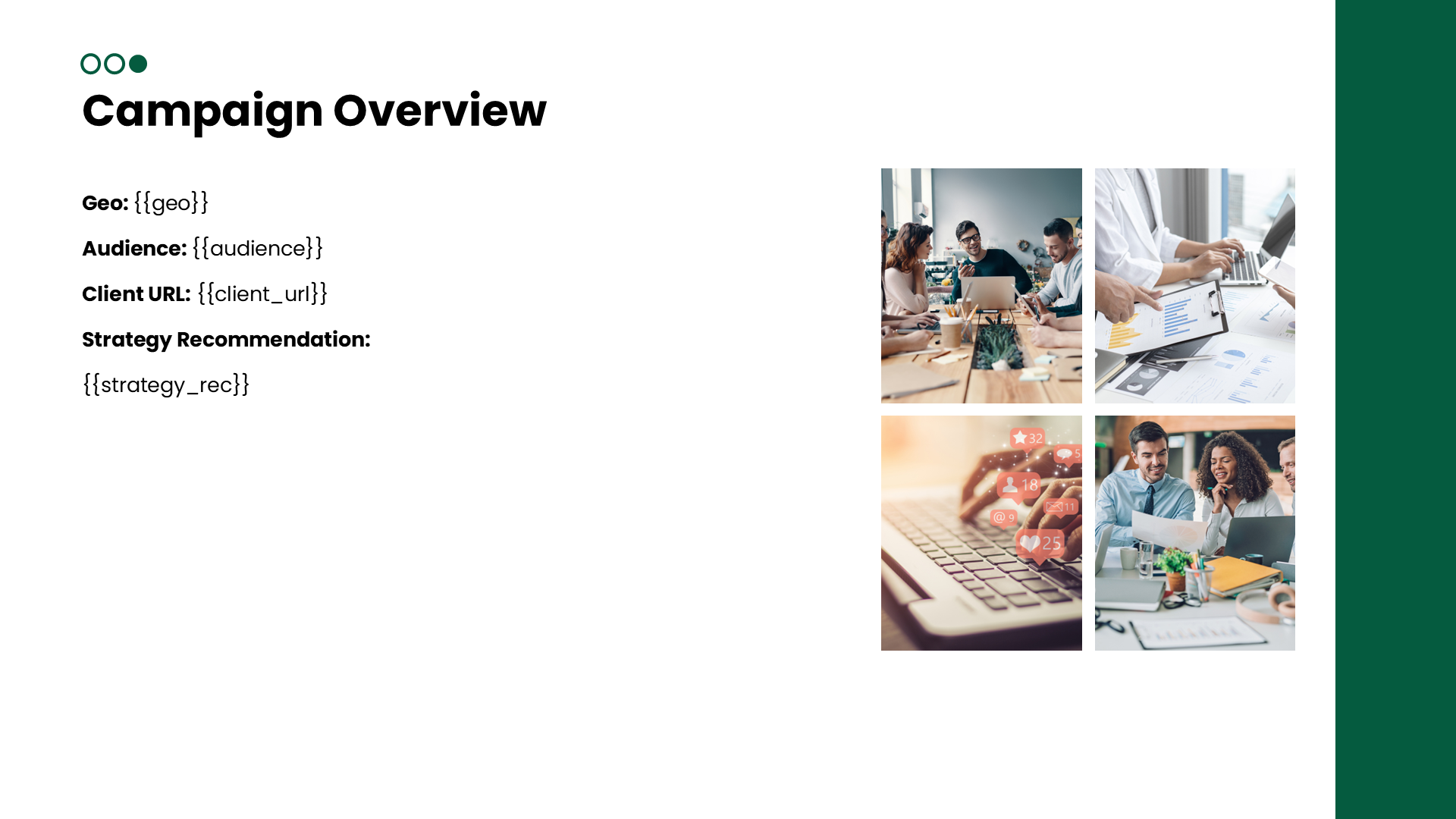
LLeMental:
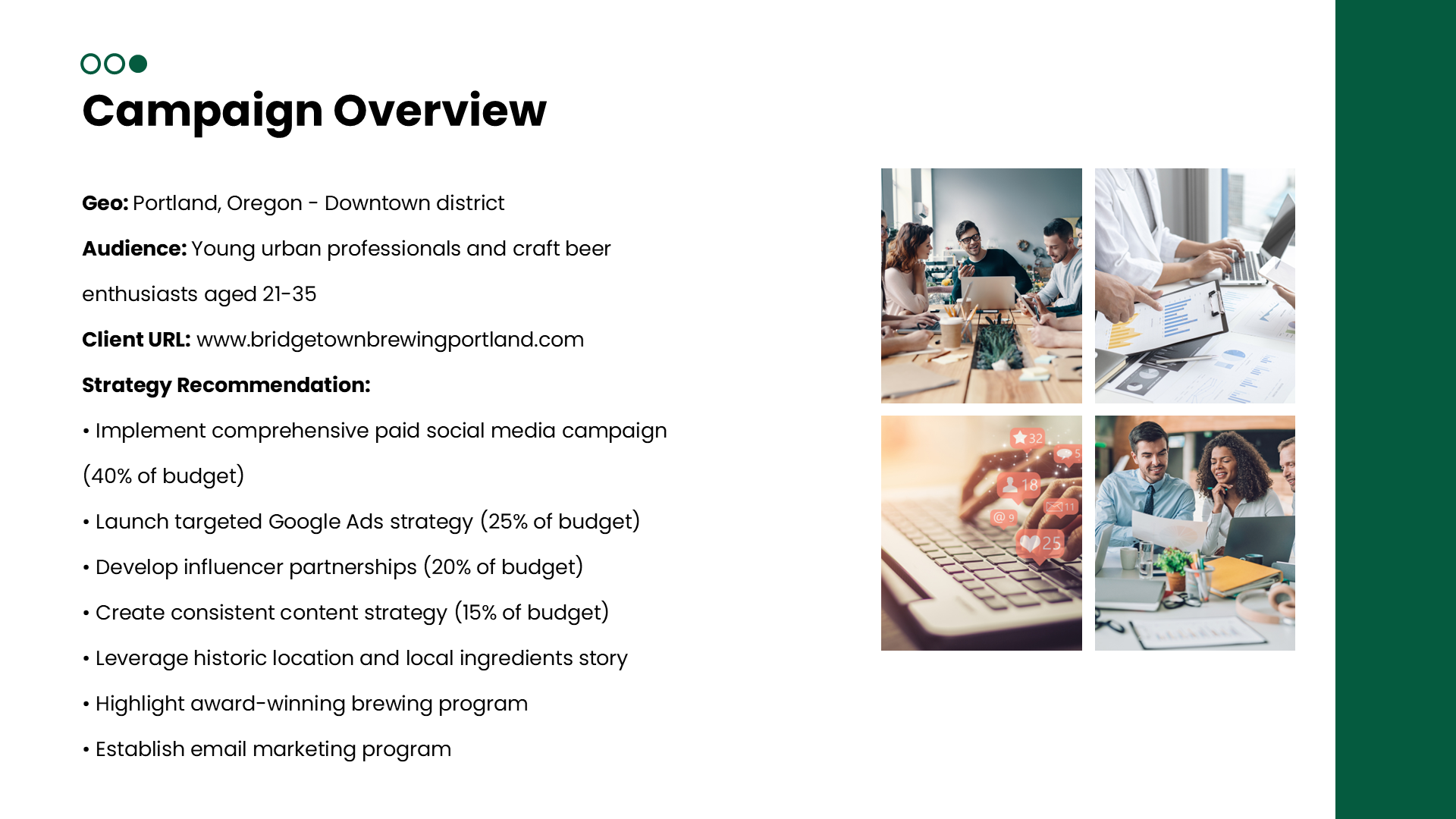
Shell:
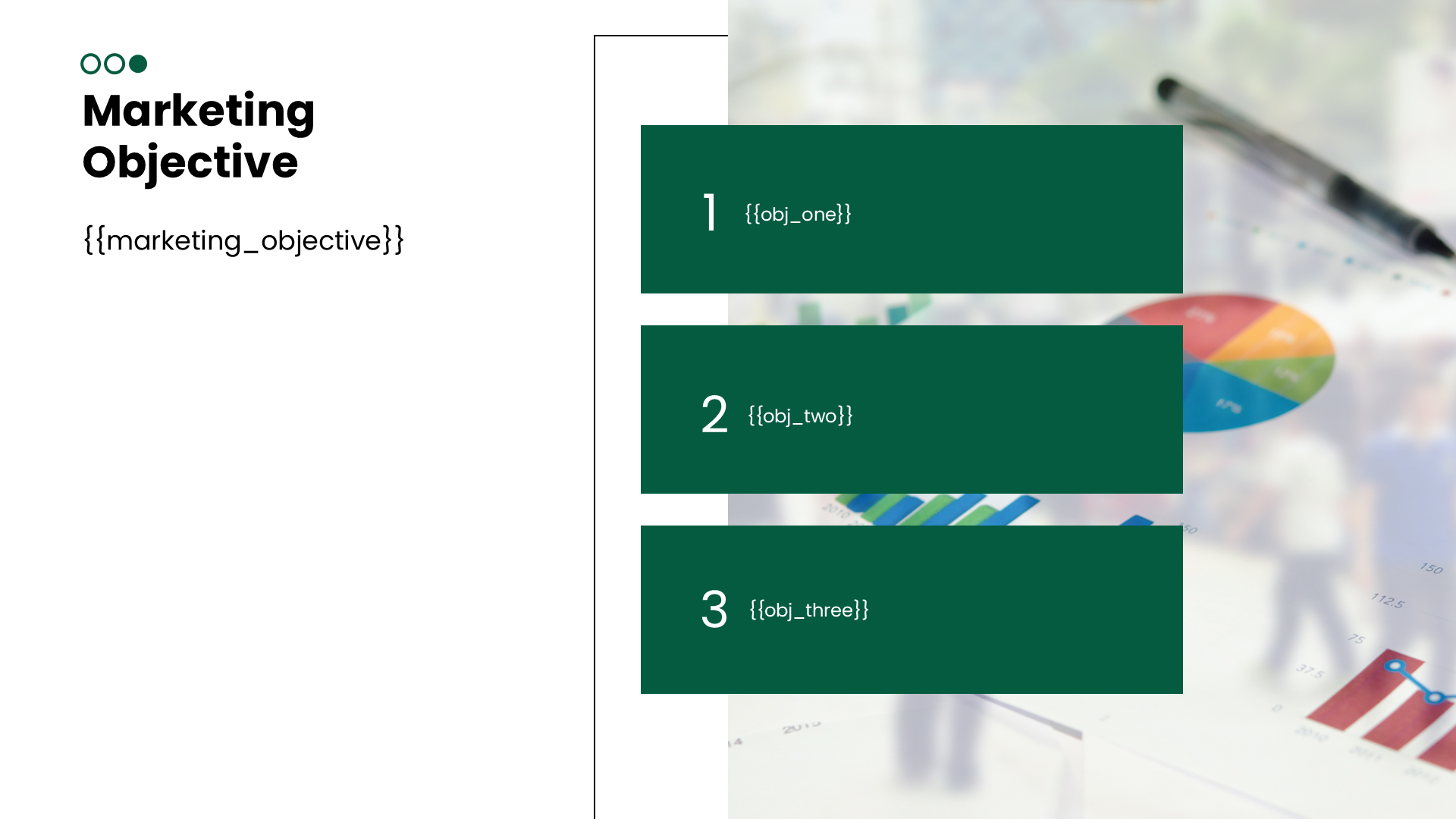
LLeMental:
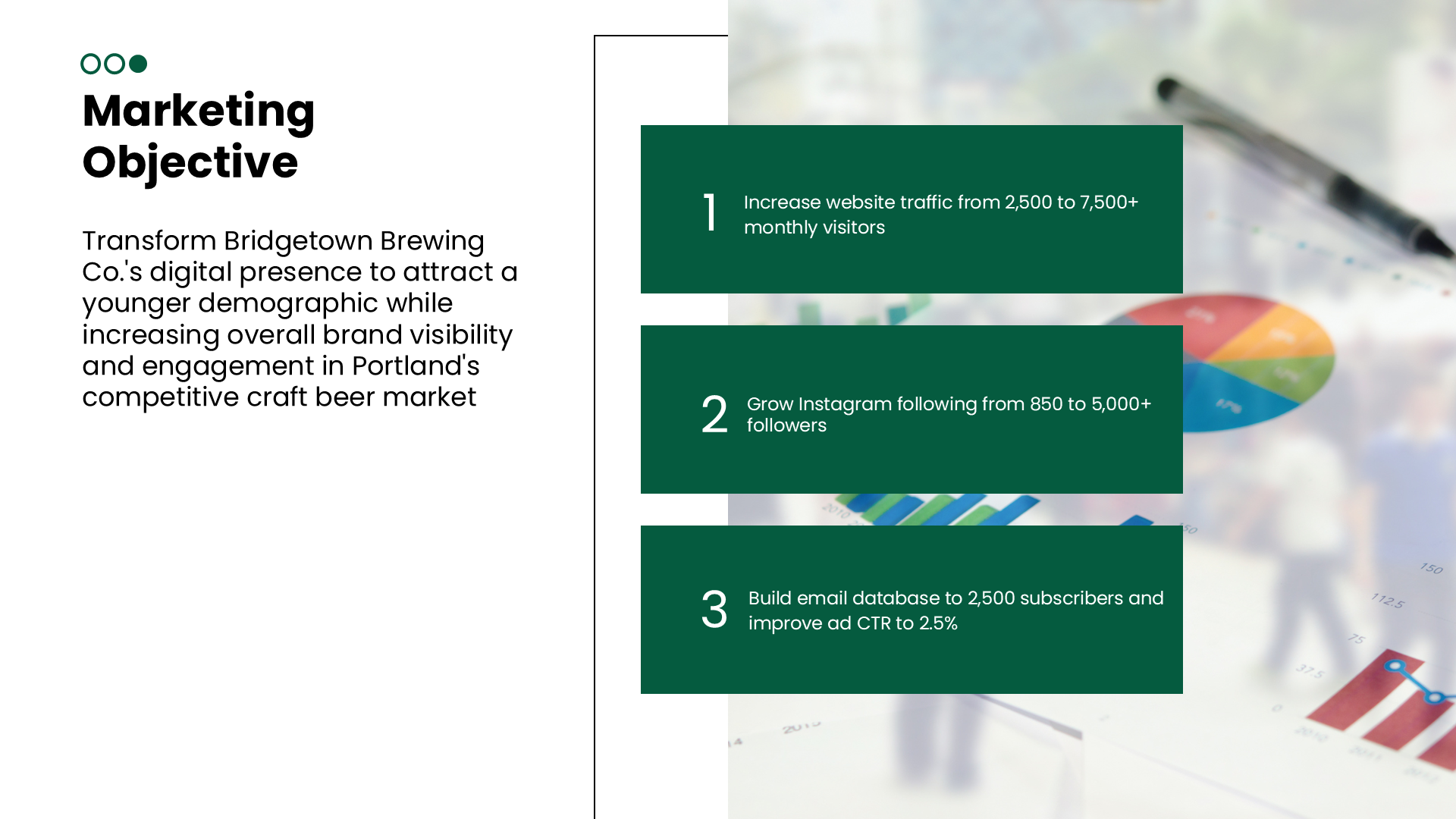
Quantified Impact: Time and Revenue Benefits
Direct Time Savings Analysis
Traditional Process:
- Discovery call transcription and organization: 30 minutes
- Research compilation and analysis: 45 minutes
- Proposal writing and customization: 90 minutes
- Design and formatting: 30 minutes
- Review and revision cycles: 45 minutes
- Total: 4 hours per proposal
LLeMental Process:
- Data upload and template selection: 1 minute
- AI generation and processing: 2 minutes
- Review and final adjustments: 2 minutes
- Total: 5 minutes per proposal
Time Savings: 3 hours 55 minutes per proposal (98% reduction)
Revenue Impact for Marketing Agencies
For a mid-sized agency creating 20 proposals monthly:
Monthly Time Recovery: 78.3 hours (20 proposals × 3.92 hours saved) Annual Time Recovery: 940 hours Opportunity Value: $141,000 annually (940 hours × $150 billable rate)
Additional Benefits:
- Response Speed Advantage: Faster proposal delivery is proven to improve win rates
- Capacity Expansion: Agencies can pursue 3x more opportunities without additional staff
- Quality Consistency: Standardized process eliminates variability in proposal quality
This transformation enables agencies to shift from reactive proposal creation to proactive business development, fundamentally changing their growth trajectory and market competitiveness.
Best Practices
While LLeMental dramatically speeds up the proposal process, following these guidelines ensures optimal results from the AI proposal generator. For agencies implementing proposal automation across their entire workflow, our comprehensive RFP streamlining guide provides additional strategies for maximum efficiency.
- Document Core Information
- Current metrics and benchmarks
- Specific pain points and challenges
- Clear goals and timelines
- Budget parameters and constraints
- Maintain Quality Templates
- Clear section hierarchy
- Consistent branding elements
- Standard content blocks
- Flexible layouts
- Review and Refine
- Verify data accuracy
- Adjust tone as needed
- Add client-specific insights
- Ensure recommendation alignment
From Notes to Proposals in Minutes
Stop spending hours manually crafting proposals. Whether you’re responding to an urgent RFP or following up on a discovery call, LLeMental helps you deliver polished, personalized presentations in minutes. Start your free trial today and see how your first proposal transforms from scattered notes to a compelling pitch.
Start Your Free Trial or Schedule a Demo to see LLeMental create professional client-ready presentations with your existing templates.